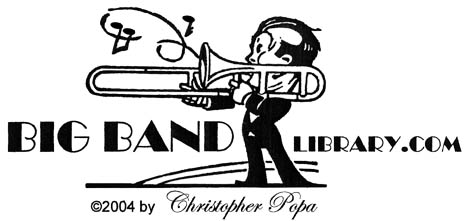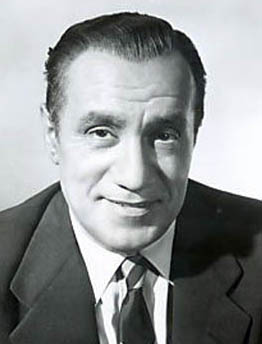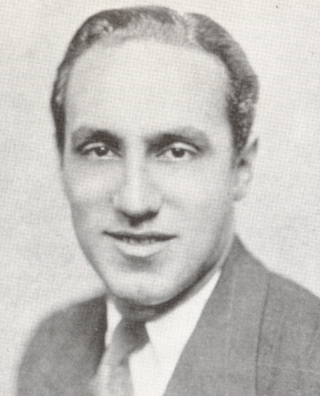
"None of us who were there can ever forget the great nights in New York," one of the band's saxophonists, Gil Rodin, later reminisced. "He'd ride this cymbal attached to the bass drum, and Benny Goodman would blow fantastic clarinet for about 20 minutes-just the two of them, the rest of us looking on speechless, and Ben almost bursting with excitement. That's the Ben Pollack I want to remember."
vital stats:
given name Benjamin Pollack
birth June 22, 1903, Chicago, IL
death June 7, 1971, Palm Springs, CA, suicide
brother Ollie Pollack
sister Esther Mendelson
wife Doris Robbins, a singer, b.Nov. 12, 1907, m.Feb. 11, 1935, div.1940
niece Ollie Grossman
membership Local 10, American Federation of Musicians, Chicago, IL, first elected Mar. 8,
1921
residences 5326 N. Kimball Ave., Chicago, IL [ 1921 ]; 1514 Cross Roads of the West,
Hollywood, CA [ 1935 ]; 1615 N. Laurel Ave., Los Angeles, CA [ 1955 ]; 550 Paseo De
Anza, Palm Springs, CA [ late 1960s ]
Pollack and his orchestra recorded for Banner in 1930-31; returned to Victor for a single session on March 19, 1933; and then were heard on Columbia in 1933-34 (another future bandleader, trumpeter Charlie Spivak, played with them during the latter period).
By that time, Pollack had fallen in love with his band's vocalist, Doris Robbins, and he seemed more interested in furthering her career (they would get married in 1935), so his orchestra quit en masse (a number of them stayed together and became the nucleus of the first Bob Crosby big band).
Pollack formed his own new band, which in 1936 recorded for Brunswick and again included some promising newcomers, trumpeter Harry James and pianist Freddie Slack.
Yet another group, with cornetist Muggsy Spanier, was organized by Pollack in 1937 and was signed to Decca Records for about a year.
In the decades which followed, Pollack played drums less and less frequently, choosing the role of a businessman.
For example, in 1942 he served as personal manager to Chico Marx, when Marx fronted a band for a series of theatre dates.
In 1945-46, Pollack ran a small, independent record company, Jewel, whose first releases were by Kay Starr, a former big band vocalist.
Pollack did make small guest appearances as himself in two mid-1950s movies, "The Glenn Miller Story" and "The Benny Goodman Story."
"I wore [ actor ] William Powell's old toupee," he managed to joke about the latter to writer-critic Leonard Feather, but he was disgruntled about how both films garbled and omitted facts.
For 10 years, starting in the '50s, Pollack operated the "Pick-a-Rib," a restaurant at 8250 Sunset Blvd., on the "Sunset Strip," in Hollywood, where he played drums with a hand-picked Dixieland combo. Often having a tough time making a financial go of it, he eventually sold out to a group which re-opened the room as the "Body Shop," a strip joint.
In 1963, Pollack led a Dixieland sextet at the Knickerbocker Hotel at 1714 N. Ivar Ave. in Hollywood.
By 1965, he had completely given up music and became a partner with his sister, Esther, in "Easy Street North," a bar located at 2777 N. Palm Canyon Dr. in Palm Springs.
Meanwhile, Pollack evidently had remained quite troubled in his personal life. His wife had first sued for divorce in 1936, but later dismissed her suit. In 1940, she proceeded and was granted a divorce, and since then, she and Pollack had made attempts to patch things up.
"Back and forth. Back and forth," he commented to a judge in 1957. "We'd tell our friends we were back together and they'd say, 'What? Again?'"
Ultimately, though, they failed to work out a lasting reconciliation.
"I'd be better off six feet under," he reportedly told a former colleague who visited him, not long before Pollack committed suicide in 1971.
Sadly, Pollack hanged himself in his bathroom at home, leaving "[ at ] least two notes referring to despondency over financial and marital problems."
"Nonetheless," historian Joe Showler wrote in 2004, "his importance as a mentor of the illustrious jazz musicians who passed through the ranks of his bands cannot be exaggerated."
Remember him that way.
sources:
"Ben Pollack; Dixieland Jazz Figure," Los Angeles Times, June 9, 1971, p.C4.
"Ben Pollack Rites Today," Los Angeles Times, June 10, 1971, p.C3.
Leonard Feather, "Pollack, Ben," in The Encyclopedia of Jazz (New York City: Horizon
Press, 1955, p.248).
---, "Pollack, Ben," in The Encyclopedia of Jazz In the Sixties (New York City: Horizon Press,
Inc., 1966), p.244.
---, "Pollack, Ben," in The Encyclopedia of Jazz in the 70s (New York City: Horizon Press
Publishers Ltd., 1976), p.275.
---, "Requiem for a Pioneer Jazzman," Los Angeles Times, June 20, 1971, p.T14.
"Former Orchestra Leader Ben Pollack Commits Suicide," Los Angeles Times, June 8,
1971, p.O1.
Will Friedwald, "The Greatest talent Scout of His Era," New York [ NY ] Sun, Dec. 13, 2005.
"Mrs. Ben Pollack Calls Union 'Financial Only': Ex-Bandleader Says They're Reconciled but
She Tells Different Story in Court," Los Angeles Times, Jul. 19, 1957, p.B1.
"Pollack, Benjamin," dues card, Local 10, American Federation of Musicians, Chicago, IL,
Mar. 1921.
Brian Rust, "Ben Pollack," in Jazz Records 1897-1942: Volume 2 Abe Lyman to Bob Zurke
(Chigwell, Essex, England: Storyville Publications, [ n.d. ]), pp.1231-1237.
Joe Showler, CD liner notes, "Ben Pollack, Volume 7," Jazz Oracle BDW 8044, 2004.
Social Security Death Index.
The big bands are back
in a new and exciting way!
BEN POLLACK
"HOTBED OF TALENT"
by Music Librarian CHRISTOPHER POPA
July 2009
In 1924, he took over an orchestra in California, which would go on to be known as his "Californians."
At least one observer considered him "The Father of Swing," since in 1925 Pollack, who played drums, hired some developing youngsters, including clarinetist Benny Goodman and trombonist Glenn Miller, to be in the band.
In 1928, while appearing at the Park Central Hotel in New York City, the group was re-christened as Pollack's "Park Central Orchestra."
Trombonist Jack Teagarden (a better player than Miller, which Miller agreed) had joined that year, and Miller decided to concentrate on writing arrangements for the ensemble.

Ben Pollack, 1955
I would like to expand this tribute with, if possible, a new interview of someone who was important to Ben Pollack's life or career. Are you an alumnus of his band, a member of his family, or a collector who is knowledgeable about his accomplishments? Please contact me via e-mail
return to "Biographical Sketches" directory
go to Big Band Library homepage

Ben Pollack, ca.1929